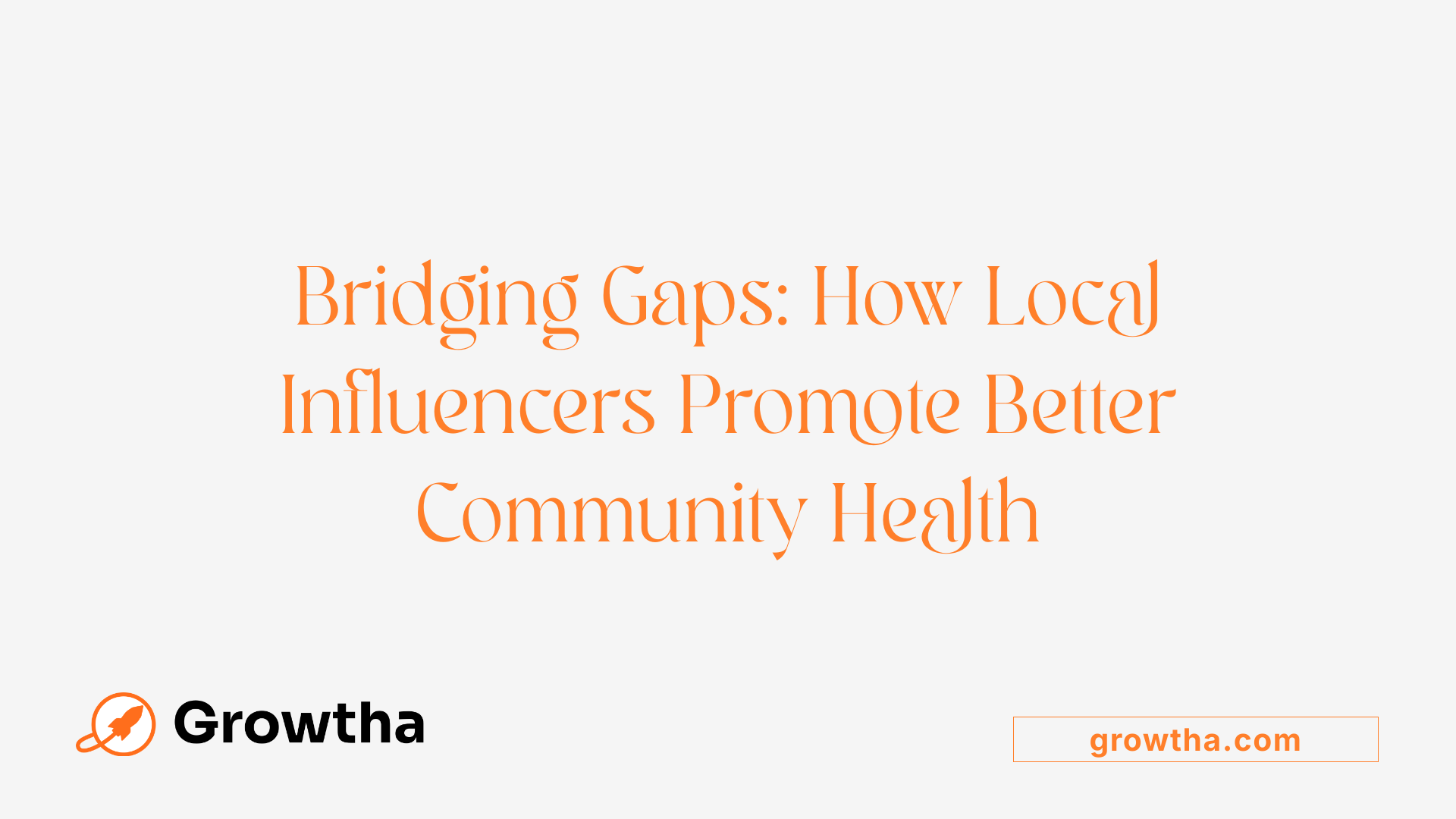The Role of Local Influencers in Community Health Promotion
Harnessing the Power of Local Influencers for Better Community Health


The Role of Local Influencers in Community Health Promotion
Understanding Community Influence in Modern Health Promotion
In an era where social media dominates communication, local influencers have emerged as pivotal figures in shaping health behaviors and attitudes within communities. Their authentic voices and close-knit connections allow them to serve as trusted ambassadors for health initiatives, bridging gaps that traditional public health messaging often struggles to fill.
The Significance of Local Influencers in Community Health

Importance of community-based influencers in health promotion
Community-based influencers, often referred to as micro-influencers or nano-influencers, are individuals deeply rooted in specific localities or cultural groups. They hold trust and credibility among their followers because of their genuine connection to the community. These influencers understand local customs, concerns, and myths, making their messages more relatable and effective.
Their role extends beyond mere content sharing; they serve as bridges between public health organizations and community members. By promoting accurate health information tailored to the community’s needs, they can enhance health literacy and foster positive health behaviors.
For example, during health crises like COVID-19, local influencers helped promote hygiene practices and vaccination awareness, often with more success than distant authorities. This is because their messages resonate on a personal level, encouraging community participation.
How influencers influence health consciousness and awareness
Influencers shape health awareness through authentic storytelling, demonstrations, and relatable content, making complex health topics accessible.
Their perceived familiarity and trustworthiness mean they can effectively challenge misconceptions and dispel myths that might hinder public health efforts.
On social media platforms like TikTok and Instagram, local influencers highlight topics such as nutrition, mental health, and disease prevention, engaging followers with culturally relevant messaging.
Additionally, when influencers share their personal health journeys, it humanizes health issues, reducing stigma and encouraging others to seek help or adopt healthier behaviors.
Potential positive and negative impacts of influencer content
Positive impacts include increased awareness, motivation for healthier lifestyles, and improved engagement with public health campaigns.
For instance, influencers promoting hand hygiene or vaccination can lead to higher compliance rates and better health outcomes.
However, there are notable risks. Some influencers inadvertently spread misinformation or promote unhealthy behaviors, such as fad dieting or unrealistic body images.
Content that glorifies unattainable ideals can contribute to body dissatisfaction, mood disturbances, and unhealthy eating habits, especially among vulnerable groups like teenagers.
It's essential for health authorities to collaborate with influencers, guiding them to share accurate, responsible information to maximize benefits and minimize harm.
Strategies for leveraging local influencers in health initiatives
Effective strategies include identifying influencers who embody community values, provide culturally sensitive messaging, and demonstrate genuine engagement.
Building long-term relationships with these influencers ensures message consistency and trust.
Training influencers on health topics, ethical advertising, and misinformation risks helps maintain message integrity.
Public health campaigns benefit from interactive content like live Q&As, testimonials, and community challenges initiated by influencers, increasing participation.
Tracking engagement metrics—such as reach, shares, and behavioral changes—allows organizations to refine strategies for future initiatives.
Characteristics that enhance influencer impact
Influencers with authentic voices, scientific credibility, and transparent partnerships tend to have more profound effects.
Personal attributes like honesty, clarity, and relatability increase followers' trust.
Influencers who actively respond to followers and participate in ongoing dialogue foster stronger community bonds.
Moreover, influencers with professional health backgrounds or training can significantly improve message credibility and impact.
The role of public health entities in influencer collaboration
Public health organizations identify suitable influencers, often through online and offline discovery methods, including social media analytics tools.
They set clear goals, define target audiences, and develop key messages aligned with health priorities.
Partnering involves providing influencers with briefings, resources, and guidance to ensure messages are accurate and ethical.
Evaluating campaign outcomes through metrics like engagement rates, attitude surveys, and health behavior indicators informs future efforts.
Benefits and challenges of using local influencers
Utilizing local influencers amplifies reach, enhances message credibility, and encourages community participation.
However, challenges include ensuring message accuracy, managing influencer motivations, and addressing ethical concerns regarding transparency.
Effective collaborations require ongoing training, supervision, and open communication channels.
Summarizing the impact of local influencers
In summary, community-based and micro-influencers are invaluable assets in health promotion. Their deep community ties, trustworthiness, and ability to craft culturally appropriate messages make them effective in raising health awareness and encouraging behavior change.
Properly managed, these partnerships can significantly advance public health objectives, especially in reaching underserved or skeptical populations.
As social media continues to evolve, harnessing the potential of local influencers through strategic collaborations will remain a vital component of innovative, community-centered health initiatives.
| Aspect | Description | Example |
|---|---|---|
| Trust & Credibility | Close ties to community | Local health advocates sharing COVID-19 vaccination stories |
| Content Strategy | Culturally relevant messaging | BIPOC influencers discussing mental health stigma |
| Engagement Techniques | Interactive formats | Live Q&A sessions on healthy eating |
| Monitoring & Evaluation | Metrics analysis | Tracking hashtag use and participation rates |
| Challenges | Misinformation & ethics | Unverified health tips spreading online |
The Ethical and Practical Considerations in Influencer-Led Health Promotion

What challenges do influencer-led health campaigns face?
Influencer-led health campaigns encounter several hurdles that can impact their effectiveness and ethical standing. Primarily, the spread of misinformation poses a significant risk, potentially leading to harmful behaviors or misconceptions among the public. Regulatory oversight remains limited in many regions, making it difficult to ensure that health messages comply with legal standards or ethical norms. Maintaining transparency—for instance, clearly indicating sponsored content—is essential to preserve public trust but is often overlooked. Additional challenges include verifying the scientific accuracy of shared information and managing unintended consequences, such as triggering body image issues or promoting unverified health claims. Campaigns need careful oversight to avoid damaging public trust or creating confusion. Overcoming these issues requires diligent content review, collaboration with health professionals, and strict adherence to ethical guidelines. Ultimately, addressing these challenges is vital to harnessing influencers' potential positively while safeguarding public health outcomes.
Why is transparency important in influencer collaborations for health promotion?
Transparency in influencer collaborations fosters trust, which is fundamental for effective health communication. Disclosing sponsorships, partnerships, or any financial incentives ensures that audiences recognize the promotional nature of content, allowing them to critically evaluate the information. Clear disclosures aligned with ethical standards and legal regulations such as the FTC guidelines uphold the integrity of the messages and prevent misinformation. When followers understand that an influencer has a commercial relationship or is working in partnership with a health organization, it reduces suspicion and enhances credibility. Transparent practices also mitigate risks of exploitation, especially when vulnerable populations are targeted. This openness not only promotes ethical integrity but also encourages responsible health promotion, ultimately leading to better engagement and more meaningful health behavior changes.
How should organizations evaluate the success of influencer partnerships?
Evaluating the effectiveness of influencer partnerships involves analyzing various quantitative and qualitative metrics. Quantitative measures include reach, impressions, engagement rates (likes, comments, shares), and click-throughs, which reveal the campaign’s visibility and audience interaction. Qualitative assessments might involve audience sentiment analysis and feedback, which indicate message resonance and trust development. Tracking behavioral outcomes—such as vaccination rates, adherence to health guidelines, or participation in health screenings—provides direct evidence of impact. Utilizing tools like social media analytics platforms and Google Analytics allows organizations to gather comprehensive data. Regular communication with influencers to gather insights and adjust campaign strategies enhances results. Long-term evaluation also involves assessing the sustainability of health behaviors and the influence's role in ongoing community trust.
What measures can ensure the ethical and effective use of influencers in health promotion?
Implementing structured protocols helps organizations ethically and effectively engage influencers. This begins with selecting reputable influencers familiar with health topics and trusted by their communities. Providing detailed social media briefing documents clarifies campaign expectations, messaging guidelines, and disclosure requirements. Training influencers on ethical considerations, such as fact-checking and avoiding misleading claims, enhances campaign integrity. Transparency mandates that all sponsored content clearly display sponsorship disclosures adhering to FTC and other relevant regulations. Regular monitoring of influencer content ensures consistent messaging and scientific accuracy. Building authentic, long-term relationships based on mutual respect fosters credibility and sustainability. Offering ongoing support, feedback, and opportunities for collaboration enhances the influencer’s ability to deliver impactful, credible health messages. Finally, comprehensive evaluation of campaign outcomes through analytics and community feedback helps measure success and guides future initiatives, ensuring campaigns are both ethically sound and practically effective.
| Aspect | Approach | Purpose |
|---|---|---|
| Challenge of Misinformation | Collaborate with credible health professionals; regular content review | Reduce misinformation, ensure factual accuracy |
| Transparency in Sponsorship | Clear disclosures following FTC guidelines | Build trust, prevent misleading content |
| Success Metrics | Reach, engagement, behavioral outcomes, feedback | Evaluate impact, refine strategies |
| Content Credibility | Use scientifically accurate information; ongoing influencer training | Maintain public trust, ethical standards |
| Community Trust | Long-term relationships, community engagement, authentic storytelling | Enhance credibility, encourage health behaviors |
Maximizing Impact Through Strategic Collaboration
Effective health promotion in communities increasingly relies on leveraging local influencers' trusted voices. Their ability to resonate culturally and foster authentic engagement makes them invaluable partners in disseminating crucial health messages. However, harnessing this potential requires careful strategies—selecting credible influencers, ensuring transparency, and continuously evaluating impact. Public health entities must balance the benefits of community trust with the risks of misinformation, emphasizing ethical collaborations and targeted approaches. Long-term relationships and culturally sensitive content can sustain community trust, encouraging healthier behaviors and improving health outcomes. As public health challenges evolve, empowering local influencers with the right tools and support will remain essential for achieving meaningful, community-wide health improvements.
References
- The impact of social media influencers on health outcomes
- [PDF] ENGAGING SOCIAL MEDIA INFLUENCERS FOR HEALTH ... - CDC
- The Emerging Landscape of Social Media Influencers in Public ...
- Influencers in Public Health: Practical Strategies for Practitioners
- The Rise of Healthcare Influencers: The Benefits
- How can public health departments engage with local communities ...
- The Role of Influencer Marketing and Social Influencers in Public ...
- More than clicks + follows: how healthcare influencers are changing ...







